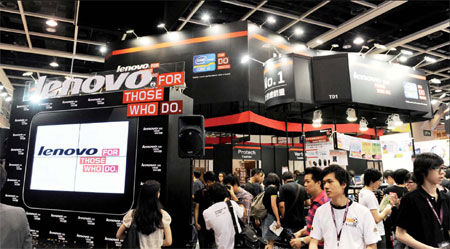Private approach on the anvil
Updated: 2013-11-01 10:04
By Bao Chang (China Daily Europe)
|
|||||||||||
Non-state enterprises likely to play a bigger role in propping up the domestic economy
Top-level Party members are expected to discuss several wide-ranging steps to pump prime the Chinese economy at the Communist Party plenum meeting in Beijing in November, experts say.
But what will make the plenum noteworthy is the twin-pronged industrial approach that will be discussed to enable private enterprises to champion the domestic economy and large state-owned enterprises to expand aggressively in global markets.
"Private capital has played a crucial role in propping up the national economy, especially during the recent GDP sags. Maintaining stable economic growth actually relies more on private companies instead of state-owned enterprises," says Mao Yushi, a noted Chinese economist.
Last year, the private economy accounted for more than 60 percent of China's GDP. As of September 2012, the number of registered private enterprises had reached more than 10 million in China, up 12.6 percent year on year, while the business scale and strength of these enterprises has risen steadily, according to data provided by the All-China Federation of Industry and Commerce.
During the economic slowdown, one of the most effective ways for the government to rejuvenate the domestic economy is to facilitate the development of private enterprises and promote its importance, experts say.
In his address to SOE executives and private entrepreneurs at a State Council forum earlier this year, Premier Li Keqiang indicated his government's commitment to provide a level-playing field for privately-owned companies vis-a-vis state-owned and foreign firms.
According to Li, China needs to come out with more market-oriented reforms. Although there may be some problems in the short term, adequate competition rules in the long run will help solve the problem, he said.
"It's heartening to note that the government has vowed to protect and help private companies," says Mao.
In his meeting with leading experts at Tsinghua University recently, President Xi Jinping indicated that the government is considering deepening reforms during the third plenum meeting.
Asia-focused lender Standard Chartered Bank in a recent research report indicated that a significant reform plan aimed at boosting economic growth would be released at the third plenum meeting.
"We anticipate that the Chinese government would consider more steps to attract private capital for infrastructure construction and investment. The participation of private companies in railways, healthcare and other sectors will lead to fair market competition and end the monopoly enjoyed by SOEs," the bank says.
Helping private capital to enter the financial, energy and railway sectors has been identified as the main thrust of China's economic reform for the next few years, experts say.
Infrastructure investment is regarded as a stimulus measure vital for economic recovery. For the third quarter, GDP expanded 7.8 percent from the same period a year earlier, marking an increase from the second quarter when it grew by 7.5 percent.
As the world's second-largest economy, China has been witnessing an economic slowdown in recent months. During the first half of the year, especially after GDP growth declined in the second quarter, overall GDP growth stood at 7.5 percent, compared with 7.8 percent last year, the slowest growth rate in 13 years.
In its report, Standard Chartered Bank said the changed business environment has been the main driver for SOE reforms. "What this means is that only the fittest enterprises will survive in the long run."
Cheng Wei, director of macro-economy and strategy development at the State-owned Assets Supervision and Administration Commission research center, says: "It is important for developing companies to go through processes such as marketization, securitization, socialization and internationalization."
"Establishing and developing global premium and competitive industry corporations will be the focus of future reforms for central SOEs," Cheng says.
Huang Shuhe, vice-chairman at SASAC, says since China's influence and importance is on the rise, it must have a group of industrial conglomerates with strong international competitiveness to match its global presence.
SASAC has set a target of converting 30 to 50 of the 112 central SOEs into top multinationals with significant competitive power during the 12th Five-Year Plan (2011-15).
Forty-four central SOEs are listed on the Fortune Global 500 this year, with China Petrochemical Corp, China National Petroleum Corp and State Grid Corp in the top 10.
As an effort to accelerate the internationalization of central SOEs, SASAC has urged these companies to increase overseas business income to half of the total revenue, from less than 38 percent at present.
"We will spare no effort to promote the international competitiveness of the central SOEs, which have been requested to withdraw from low-end industrial chains and concentrate on premium overseas markets," says Liu Nanchang, director of the performance evaluation bureau at SASAC.
Overseas assets of Chinese companies, which have more than 15,000 branches worldwide, are valued at more than $1 trillion, with half coming from state-owned enterprises, according to the commission.
Acting as the mainstay of domestic economic development and China's "go abroad" process, central SOEs are to become worldwide industrial giants that could compete with foreign companies. This goal will be achieved soon, SASAC says.
China's SOEs, which are engaged in key economic activities such as petroleum, gas, telecommunications, electric power generation, aviation and shipping, are currently the pillars of the economy.
In April, SASAC required all central SOEs to ensure at least a 10 percent profit increase this year. Data from the Ministry of Finance show that from January to September, central SOEs generated total profits of 1.3 trillion yuan ($213.7 billion), an increase of 16.3 percent year on year.
baochang@chinadaily.com.cm
|
A Lenovo display stand at a recent exhibition in Hong Kong. The Chinese government is encouraging private enterprises to play a bigger role in developing the national economy. Song Zhenping / Xinhua |
(China Daily European Weekly 11/01/2013 page8)
Today's Top News
Premier Li seeks point of balance
Reform roadmap before key meeting
Intel leaks proved justified: Snowden
Cooperation needed in terror fight
Beijing to further boost visa-free stay
Shenzhou X crew awarded for outstanding service
US to file murder complaint against LAX shooter
China's non-manufacturing PMI rises in October
Hot Topics
Lunar probe , China growth forecasts, Emission rules get tougher, China seen through 'colored lens', International board,
Editor's Picks

|

|

|

|

|

|






